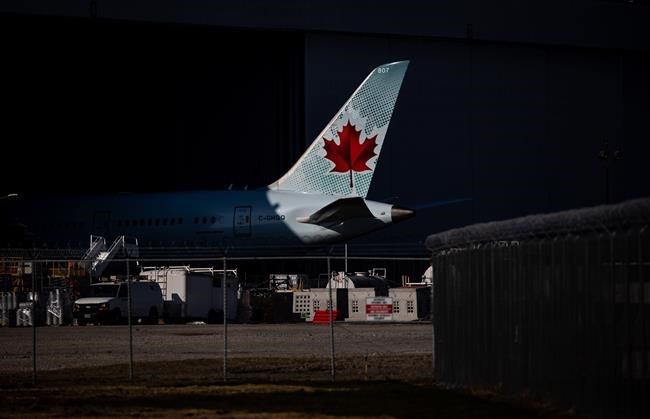MONTREAL — A passenger rights company is calling on the country's transportation regulator to take a stand against airlines that bar travellers from engaging a third party to seek compensation until their claims have already been rejected.
So called "contact airline first" clauses stipulate that passengers seeking compensation must initially reach out to the airline directly, rather than filing a claim through a law firm, company or advocacy group. Berlin-based AirHelp says the provisions protect carriers' interests at the expense of their customers, depriving them of key information when they ask to be compensated for delayed flights or damaged luggage.
"'Contact airline first' clauses are often used as an opportunity to reject and filter out many valid claims, as the airlines know the majority of passengers will not pursue the matter further," AirHelp chief legal officer Christian Nielsen said in release.
Up to two-thirds of Canadian claimants give up their claim after an initial rejection by the airline, according to an online YouGov survey last year that included 10,400 participants from nine countries.
A 2019 AirHelp study drawing on hundreds of thousands of the company's claims also found that airlines wrongfully reject more than 50 per cent of valid claims at first.
Air Canada customer Steve Pereira hopes to force legal clarity on the issue with a case now before the Canadian Transportation Agency, though a backlog of thousands of complaints could delay the outcome.
The regulator upheld Air Canada's clause in a decision from March 2019, the airline noted.
"It is always our desire to resolve any issues that arise quickly and fairly," Air Canada spokesman Peter Fitzpatrick said in an email.
"The agency said our approach is a means to minimize delays and offers an efficient way to resolve claims (noting our online process is very easy to use and customer friendly), it protects the interests of passengers, and is in keeping with the intent of other regulations, such as the EU rules."
AirHelp says the precedent comes into question in the wake of recent case law abroad and a new passenger rights charter in Canada.
"Times have changed," Nielsen said in a phone interview.
"Over the last two years, that case law has been overturned. So now in Europe it’s illegal,” he said, citing a pair of rulings in German and Austrian courts over the past 12 months.
The federal government rolled out its Air Passenger Protection Regulations last year, which lay out compensation requirements for incidents ranging from tarmac delays to flight bumping.
Airlines filed a court challenge soon after arguing the regulations go too far on mandatory compensation, while consumer advocates say the rules grant carriers too many exemptions.
Air Canada and Porter Airlines Inc., along with 17 other applicants that include the International Air Transport Association — which has some 290 member airlines — state in a court filing from June 2019 that required payments under the air passenger bill of rights violate international standards and should be rendered invalid.
The rules require passengers to be compensated up to $2,400 if they are denied boarding because a flight was overbooked and receive up to $2,100 for lost or damaged luggage. Compensation also includes up to $1,000 for delays or cancelled flights.
Advocates have said the criteria for monetary compensation are tough to meet as passengers have to present evidence that is typically in the hands of an airline.
This report by The Canadian Press was first published Sept. 28, 2020
Companies in this story: (TSX:AC)
Christopher Reynolds, The Canadian Press
Note to readers: This is a corrected story. An earlier version described AirHelp as an advocate.




